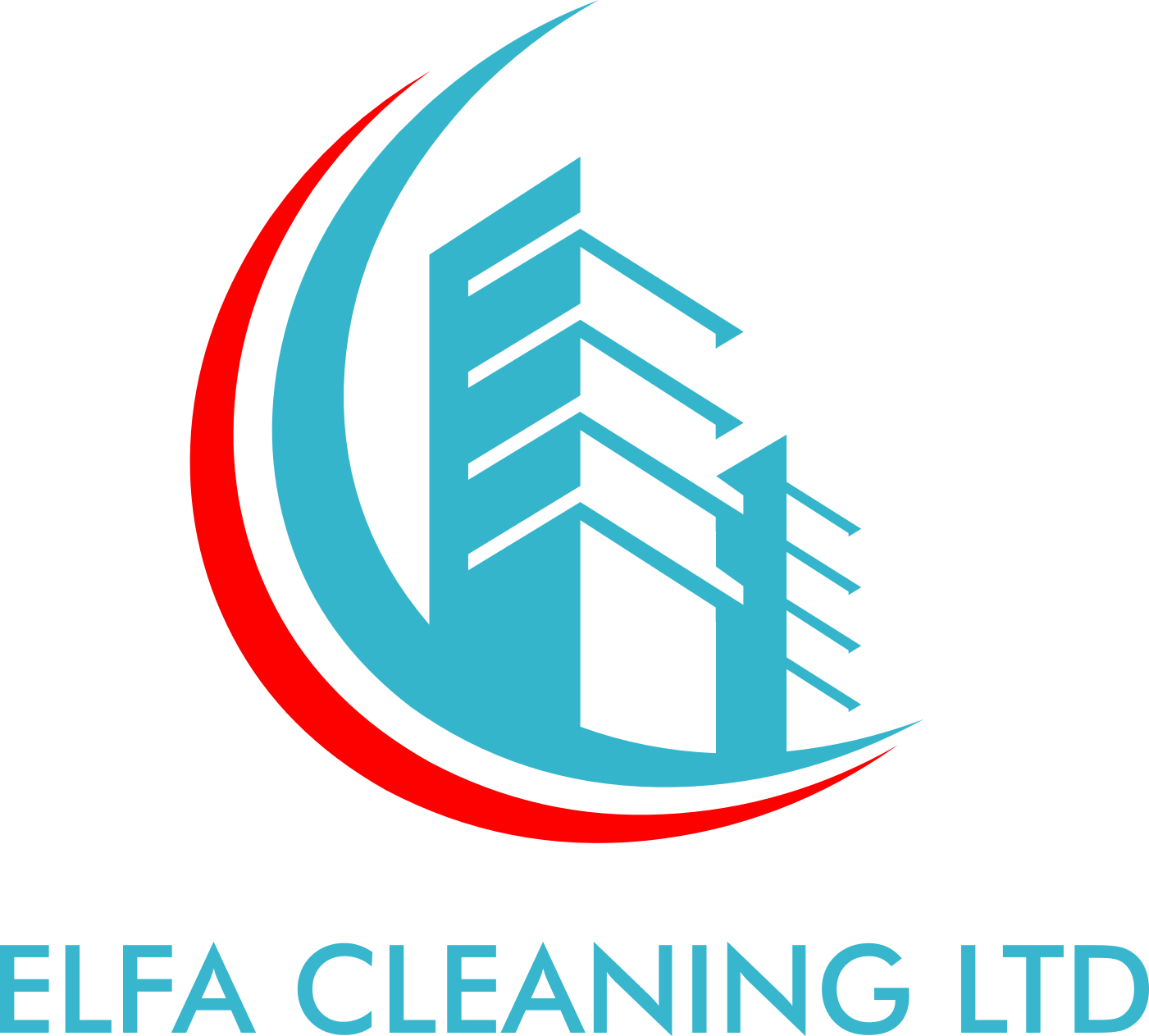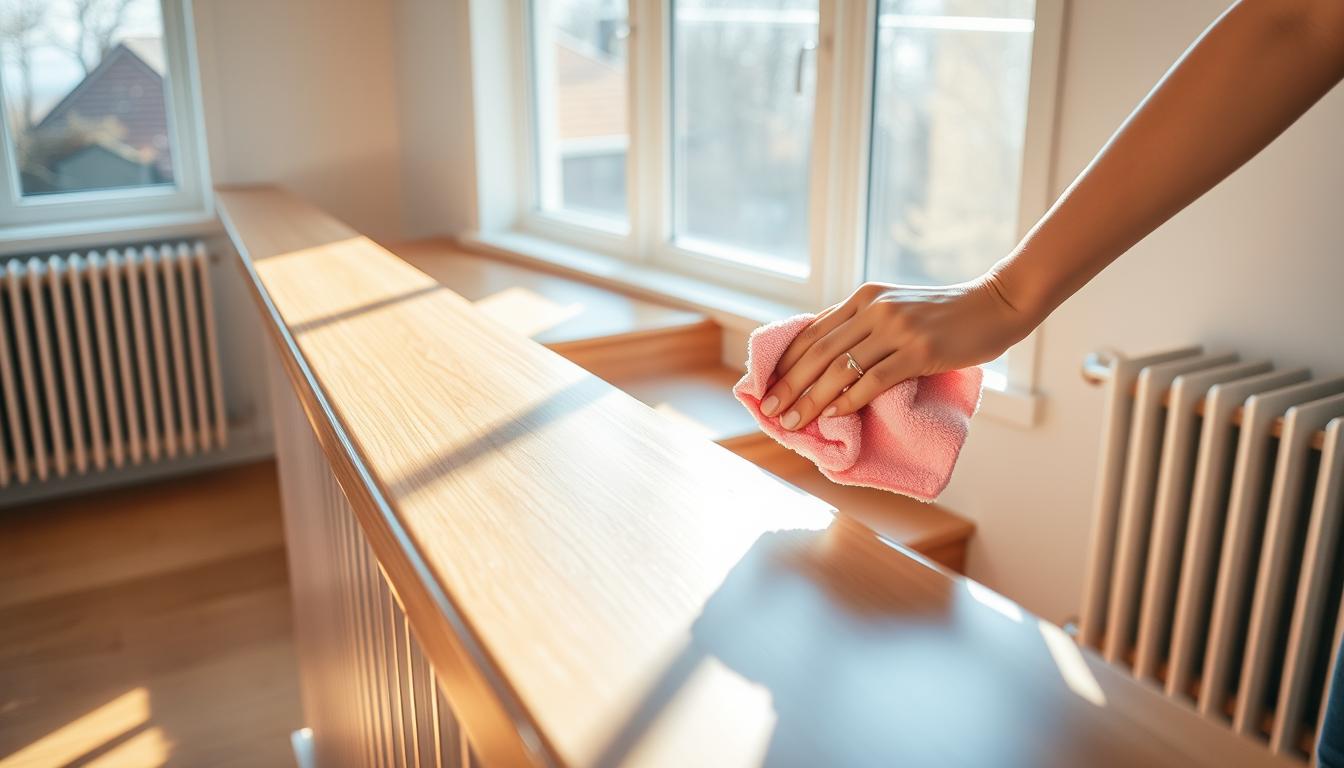ELFA Cleaning LTD presents a friendly, practical guide to help UK households keep surfaces looking their best while improving warmth at home. This short introduction sets expectations for a clear, step-by-step process that saves time and effort.
We focus on safety first, then efficient dust removal and a careful wipe-down to lift grime without harming paint, varnish or polished finishes. You will learn how a tidy heater works better: removing debris can improve heat transfer and may save up to 25% on energy bills — roughly £225 a year.
This guide covers tools, simple safety checks, practical steps for timber spindles and a chrome towel model in the bathroom, plus finishing tips to avoid marks. Even a first-time DIYer can achieve professional-looking results by following ELFA’s method.
Key Takeaways
- One organised session pairs preparation with the right tools for a quick, effective process.
- Safety and gentle methods protect painted surfaces and polished finishes.
- Removing dust improves heat output, saving energy and money.
- Regular light upkeep keeps full cleans quicker and less frequent.
- Simple household items and small habits deliver professional results.
Why a thorough clean matters right now in the UK: efficiency, safety and a smarter shine
A short, effective session on household heat units returns responsiveness and reduces dust around the house. This is the best time to act because the UK heating season increases use, draws in particles and makes any inefficiency more obvious.
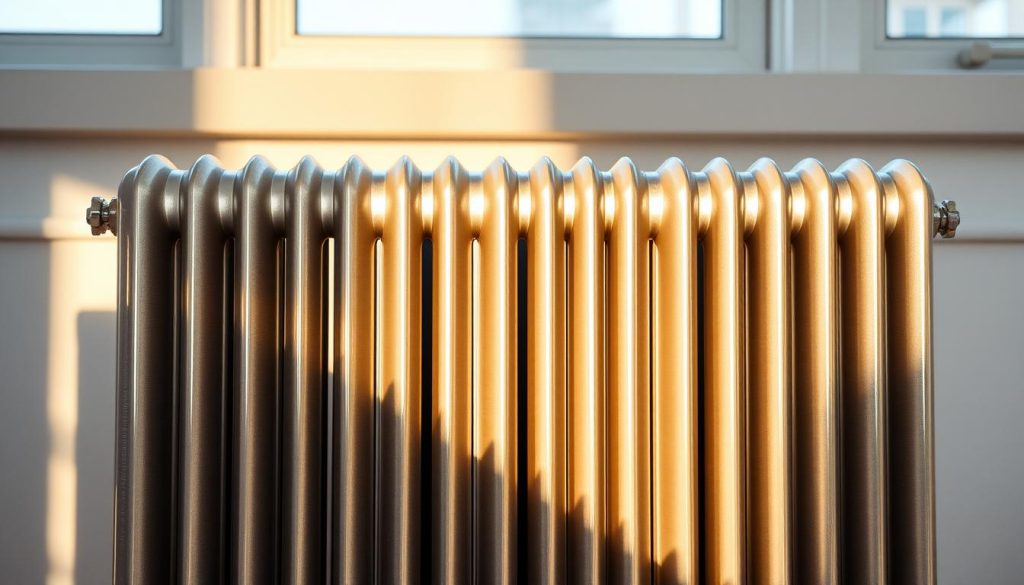
Save energy and eliminate cold spots
Dust build-up on radiators blocks convected warm air. That creates cold spots and forces the system to work harder, costing you more over time. A simple deep tidy—clearing top grills and fins—can improve performance and help save up to 25% on bills.
Health and hygiene: cutting dust and debris
Reducing loose dust and debris improves indoor air quality and helps allergy sufferers. Use a vacuum brush, long duster or a cool hairdryer to dislodge hidden build-up before a damp cloth pass.
- Follow sensible steps: dry dust first, remove covers where safe, then damp cloth to lift films.
- Towel radiator areas collect lint and moisture; regular attention stops smells and keeps bathrooms fresher.
- If cold patches persist, a professional powerflush may be needed to remove internal sludge from a radiator.
ELFA Cleaning LTD stresses that small, regular cleaning gives quicker heat response, fewer draughty areas and a smarter shine with minimal cost or time.
Safety first: preparation before you touch a banister or radiator
Before any work begins, establish a safe workspace so you can tackle rails and radiator surfaces without risk. Turn off the heating and let every unit cool fully. This prevents burns and stops convection from pulling more dust into the room.
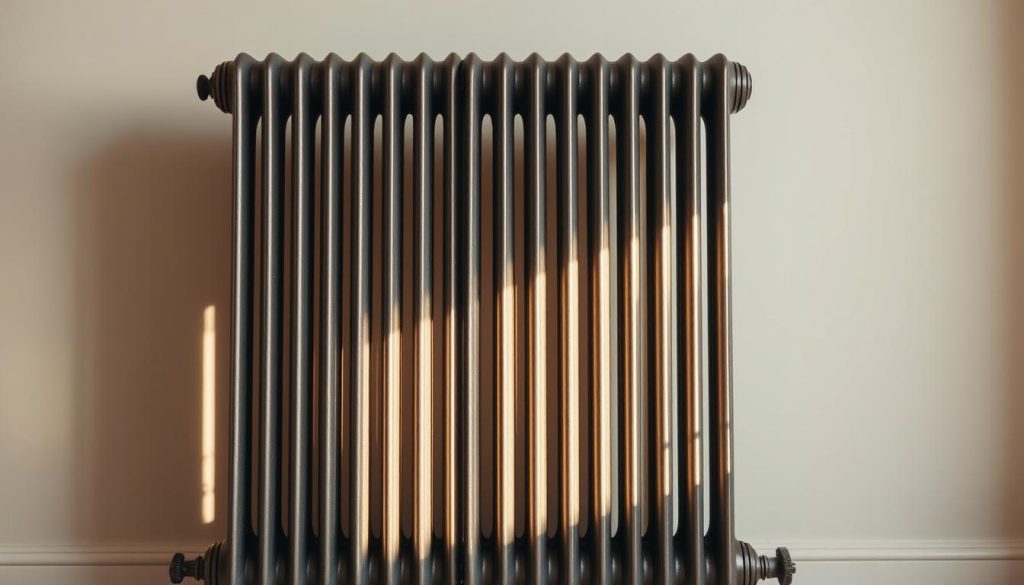
ELFA Cleaning LTD asks you to protect floors and skirting with towels or a drop cloth. Remove jewellery and secure loose sleeves. Unplug electric radiators or isolate them at the mains before you start.
Keep water away from sockets. For bathroom areas and chrome towel fixtures, wring cloths well to avoid drips near electrics. Use a vacuum with a brush attachment or a radiator duster first to remove loose dust.
- Make sure the heating is switched off and cool to the touch.
- Lay towels beneath the rail and radiator to catch debris and moisture.
- Plan the sequence: dry dust first, then a targeted damp pass to finish the process.
These simple steps keep the job safe, tidy and efficient so the rest of the process runs smoothly.
Tools and materials checklist for a smooth process
Gathering the right kit makes the job quicker and keeps surfaces safe from scratches or streaks. ELFA Cleaning LTD recommends simple, affordable packs that deliver professional results at home.
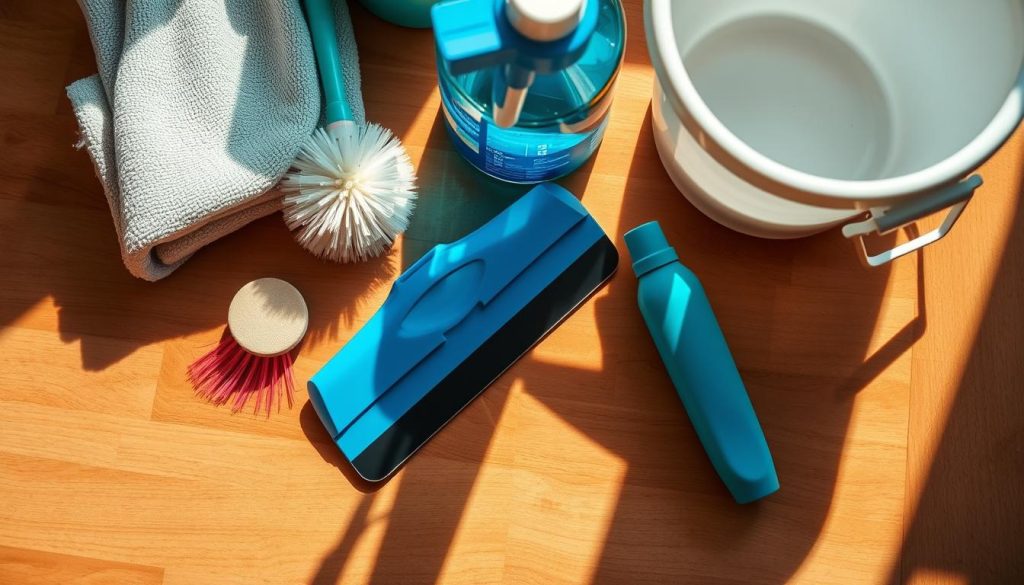
Hand items for gentle care
Use soft cloths for general dusting and a dedicated microfibre cloth for polishing. A cloth sponge gives controlled damp cleaning where needed.
Long-reach tools and machines
A radiator brush or long flexible duster reaches between fins. Add a hoover with a brush attachment to lift lint before any damp pass.
- Soft cloths, microfibre cloth, cloth sponge, radiator brush
- Vacuum with brush attachment, a small amount mild detergent, jug of soapy water
- White vinegar for hard water marks, towels or a drop cloth, small bucket
- Optional: old toothbrush for joints, DIY long brush for deep columns
| Item | Purpose | ELFA tip |
|---|---|---|
| Radiator brush | Reach between fins | Avoid spray cleaners on top-grill units |
| Microfibre cloth | Polish to streak-free shine | Label for polishing only |
| White vinegar | Remove limescale and water spots | Test on chrome in a discreet spot first |
Label cloths for dusting, washing and polishing to prevent cross-contamination. Test any solution on an unseen area, especially on stained wood or older finishes.
How to clean and wipe banisters and radiators
The first step is a dry pass with a brush or hoover to capture loose dust before any damp work.
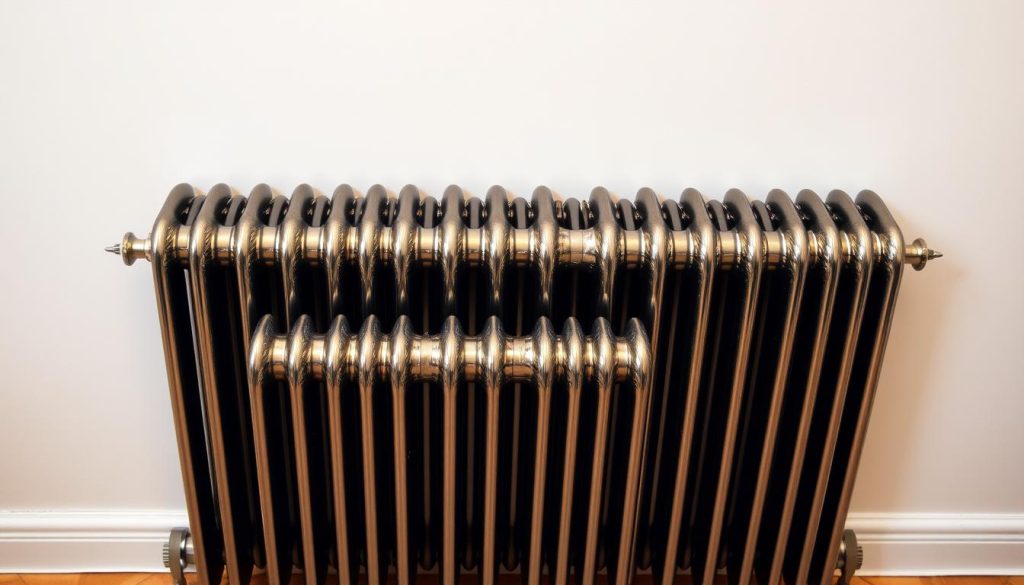
Work from top to bottom so soapy water and loosened debris never run onto areas already finished. Use a long duster through a top grill where possible, then vacuum with a brush attachment to keep the room tidy.
- Start by dry dusting rails, spindles and the front of the radiator using a vacuum brush to limit airborne dust.
- Move on to a lightly damp cloth or a soft sponge in fresh soapy water to lift fingerprints and sticky spots without over-wetting surfaces.
- Use a separate cloth for the bathroom and towel rail to avoid cross-contamination.
- Wring cloths well near sockets and thermostats, then follow with a dry towel to catch drips.
- Inspect joints and decorative features; use a cloth-tipped tool for tight creases.
Finish with a rinse in clean water and a final dry pass. This simple process keeps mess low and results high for radiators and wooden rails.
Step-by-step: clean and wipe household banisters to a safe, polished finish
A measured, top-to-bottom routine keeps timber finishes safe while restoring a neat, polished look.
Begin with dry dusting. Use a microfibre or long duster to lift dust from the rail and spindles. Draw the cloth along the grain to remove particles rather than pushing them into joints.
Next, prepare a soft cloth wrung well in warm, mild soapy water. Wipe from the top rail down each spindle, catching drips with a towel at the base to protect skirting and floors.
- Pay special attention to newel posts, caps and high-touch areas where oils build up fastest.
- For mouldings, wrap the cloth around a blunt tool to reach grooves without scratching the finish.
- Refresh the cloth often so you never drag dirty water across cleaned sections.
Finish by checking for loose fixings or nicks and note any small repairs. Use a dry towel to remove all moisture so varnish or paint stays intact.
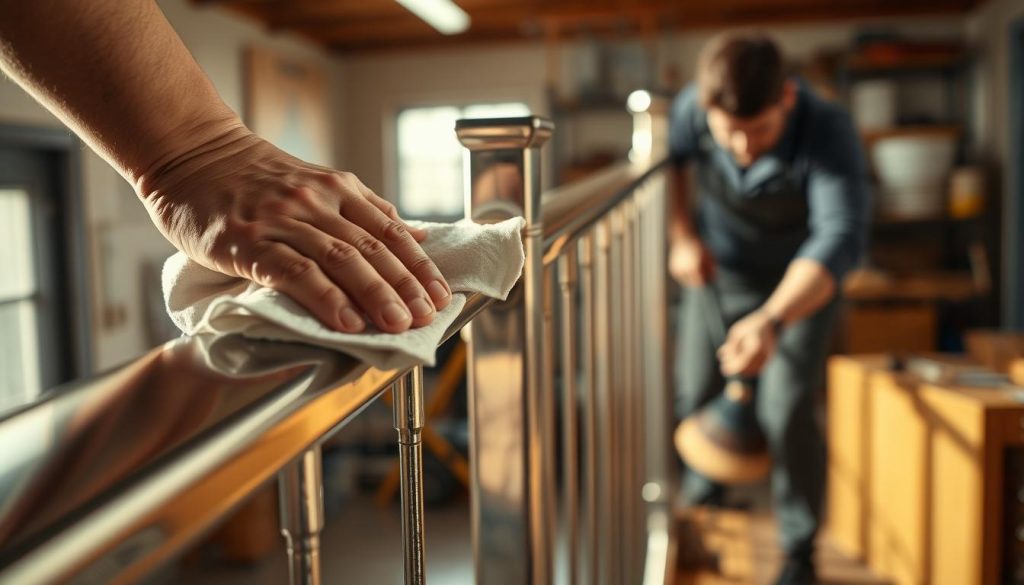
| Stage | Action | ELFA tip |
|---|---|---|
| Dry dust | Microfibre along grain | Lift dust, avoid pushing into corners |
| Soapy pass | Soft cloth, top to bottom | Wring often; protect skirting with a towel |
| Detail & dry | Cloth-wrapped tool; dry towel finish | Note repairs; ensure fully dry to protect finish |
Standard radiators with a top grill: deep cleaning for better heat
Clearing internal fins in a surface radiator stops dust from blocking convection and gives an immediate benefit.
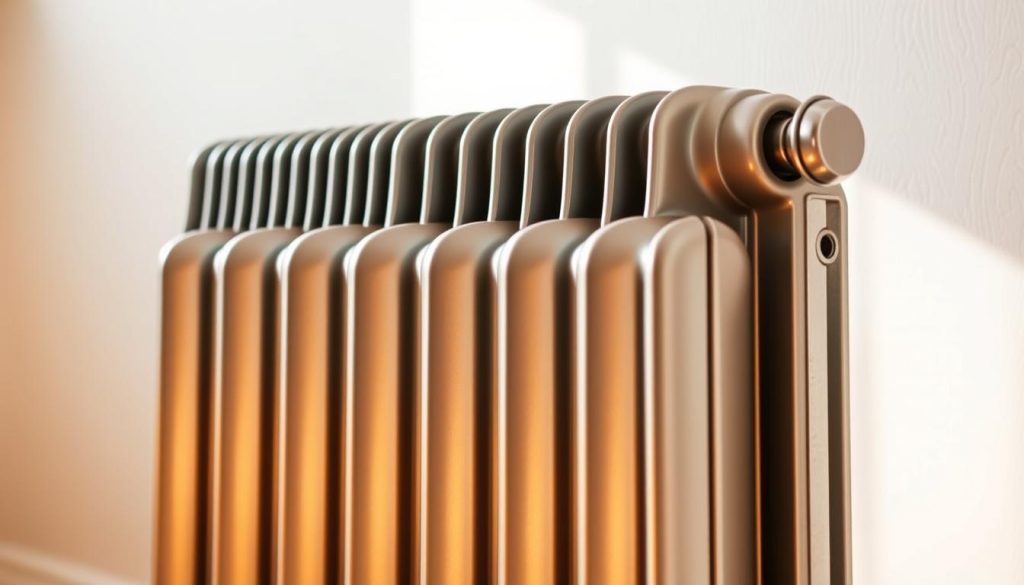
Start by switching the system off and waiting until the unit is cool. Unclip the side panels by lifting them upwards, then lift off the top grill to expose fins and vents.
Use a long radiator duster to feed down between the fins and loosen trapped dust. Follow this with a vacuum brush to capture fallen dust and any loose debris.
Avoid spray cleaners; they can push moisture into gaps. For stubborn marks, use a lightly damp cloth or a soft sponge and take care near valves and controls.
- Give the grill a soapy water pass, rinsing the cloth often so you do not re-smear residue over vent openings.
- Wipe the front and sides of the radiator with a clean cloth, finishing with a microfibre cloth for a streak-free shine.
- Refit the top grill and side panels snugly so they do not rattle when the system heats up.
ELFA Cleaning LTD notes that removing this dust delivers faster, more even heat. If you need new dusters or brushes, many UK suppliers offer day delivery so you can finish the job promptly.
Towel rails and chrome towel radiators in the bathroom
A quick, gentle routine keeps bathroom rails bright without risking scratches or streaks. Turn the heated towel rail off and let it cool before you start. This step prevents burns and stops warm air drawing more dust into the room.
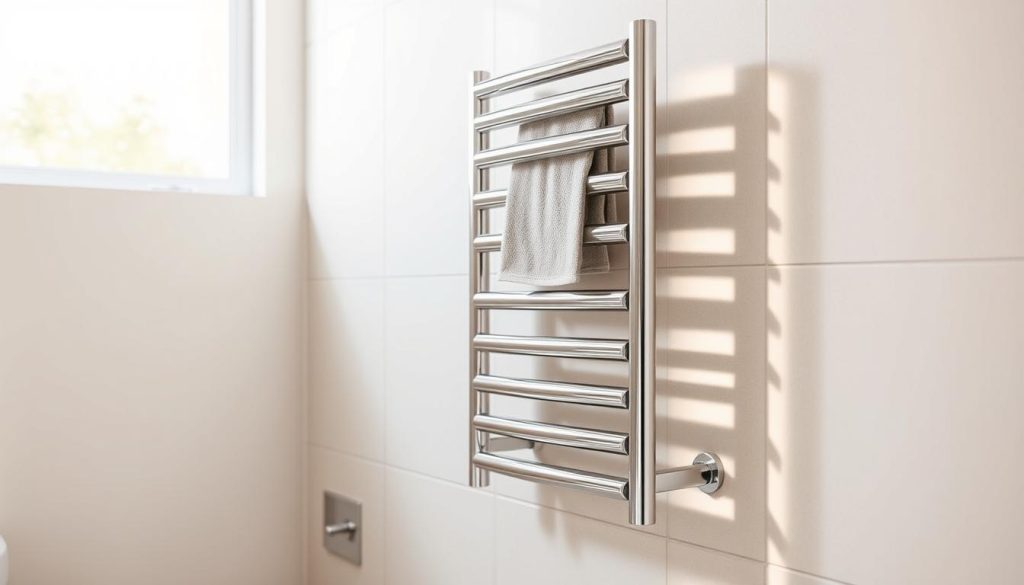
Begin with a dry dust to remove loose fibres and hair. Next, use warm, soapy water with a soft cloth or sponge to lift fingerprints, product residue and daily film.
Target watermarks and fingerprints
For stubborn watermarks on chrome towel surfaces, mix equal parts white vinegar and water. Dab the solution on marks, leave for a few minutes, then rinse and pat dry.
Buff to a streak-free shine
Finish with a microfibre cloth to polish each rail and bar. Work top to bottom so drips don’t run over finished areas. Avoid abrasive pads or harsh chemicals to preserve the reflective finish.
“A weekly light polish on a heated towel keeps it looking pristine and reduces build-up between deep cleans.”
- Check joins and brackets for trapped grime.
- Swap towels for fresh ones after you finish to avoid new lint clinging to rails.
- Repeat a light polish weekly for best results.
- Dust first; wash with warm soapy water using a soft cloth.
- Treat hard water stains with 1:1 white vinegar, rinse, then dry.
- Polish with a microfibre cloth to prevent spots and streaks.
ELFA Cleaning LTD showcases gentle methods that keep bathroom fixtures shining without damage while improving the overall look of the room.
Heated towel rails, dual fuel and radiator valves: gentle care, better performance
Give special attention to moving parts. Small faults at valves or joints can affect performance and safety. ELFA Cleaning LTD recommends light, regular attention around these areas for reliability.
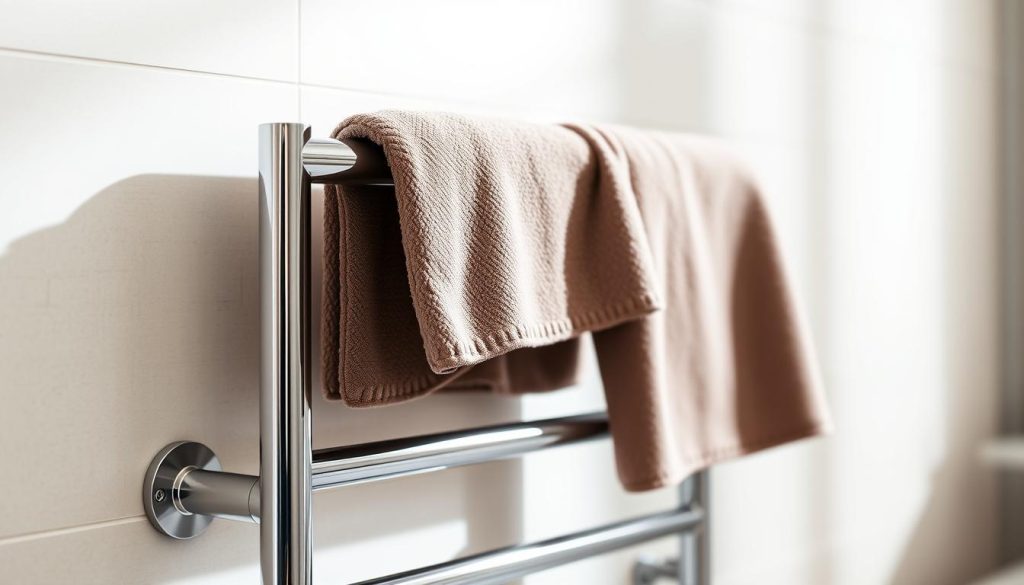
Make sure power and heat are off before you start
Make sure the system is switched off and completely cool. For dual fuel setups, isolate electric power and shut off the central heating feed before any work near the electric element.
Care around valves, brackets and adjustment heads
Use a light touch with a damp cloth around radiator valves and TRVs. Keep moisture away from adjustment heads and electrical parts to avoid damage.
- Wipe brackets and wall plates dry to prevent spotting in humid rooms.
- Inspect valve nuts for staining or damp that may signal a small weep.
- If you spot wear on valve connections, tighten cautiously or contact a professional.
| Item | Action | ELFA tip |
|---|---|---|
| Dual fuel towel setup | Isolate electric supply and shut central feed | Turn off at mains and the boiler to remove power safely |
| Radiator valves | Light damp pass around bodies only | Avoid the adjustment head; dry immediately |
| Brackets and wall plates | Remove lint, dry thoroughly | Prevent corrosion in bathrooms |
| Heated towel rails | Polish accessible bars gently | Reduces dust cling and keeps a neat shine |
Finish with a gentle polish on the heated towel rail and routine checks of radiator valves to keep systems working well.
Column radiators and cast iron: reaching tight gaps without damage
Older column units need patient attention to reach the narrow channels that trap dust. ELFA Cleaning LTD advises gentle methods to preserve paint and ornate castings while improving heat output.
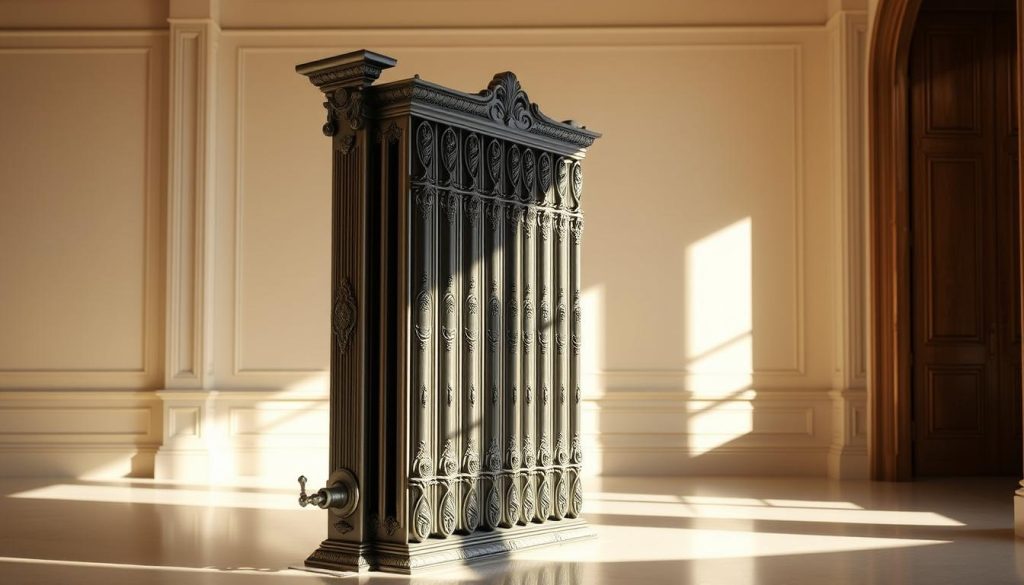
DIY long brush for between columns
Create a long brush by securing a soft cloth to a wooden spoon or dowel. Slide this between columns, working slowly to lift trapped dust.
Vacuum along each channel as you go so loosened particles do not settle on skirting or floors.
Soapy water on the surface; toothbrush for detail
Use a cloth dampened with a small amount mild detergent in warm soapy water for the outer faces. Keep moisture light to protect old paint and joints.
Use an old toothbrush to access tight joins and follow with a dry pass so water does not remain where rust might start.
Special note on polished finishes
For polished or bare-metal pieces avoid water entirely. Use a soft lint-free cloth and a touch of protective oil to prevent oxidation.
Check radiator valves and end caps while close up, wiping gently and confirming there is no play or seepage.
- DIY brush: cloth on a stick to lift hidden dust.
- Work patiently and vacuum as you progress.
- Expect better warmth and a neater finish once internal dust is removed.
Electric radiators and electric towel rails: safe cleaning around electrics
When electrical parts are present, safety is the priority. Turn the unit off, unplug it or isolate at the mains or thermostat before you begin. Let the heater cool so you can work without risk.
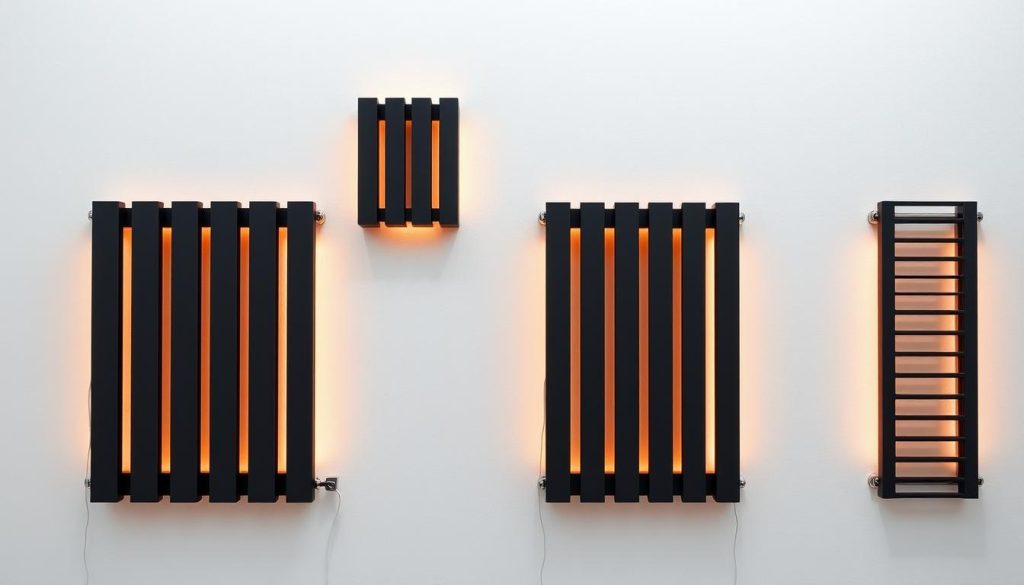
ELFA Cleaning LTD stresses careful moisture control and basic pre-checks for all electrical appliances. Remove loose dust first using a vacuum brush or a dry microfibre cloth, paying attention to grilles, vents and crevices where fluff gathers.
Safe surface care
Use a lightly damp microfibre cloth for stubborn marks. Keep water away from seams and control panels so nothing wicks into the unit.
Drying and inspection
Always dry radiator thoroughly before restoring power. Check the plug, thermostat housing and cable for cracks, frays or warmth marks. If you spot damage, get a qualified electrician to inspect or repair.
Heated towel notes
If an electric towel unit is fitted, give bars and brackets a light pass too so lint does not blow back onto vents when the unit is next used.
| Action | Why it matters | Tool | ELFA tip |
|---|---|---|---|
| Isolate power | Prevents shock and false heating | Switch off at mains/thermostat | Make sure unit is cold before work |
| Remove dust | Improves airflow and performance | Vacuum brush, dry microfibre cloth | Work around vents gently; avoid pushing dust inside |
| Damp mark removal | Removes residue without wetting internals | Lightly damp microfibre cloth | Never allow dripping water near controls |
| Final check | Ensures safe restart | Visual inspection | Dry radiator thoroughly; call a pro for cable faults |
Finishing touches: dry, polish and rehang towels
The last stage is all about drying, shining and making sure towels hang free so heat can circulate properly.
Dry radiator thoroughly to prevent rust and spots
Rinse away residues after washing, then dry radiator thoroughly with a clean microfibre cloth. Remove any last traces of moisture so mineral spots do not form and no trapped water encourages corrosion under brackets.
Final polish on chrome towel radiator for mirror-like finish
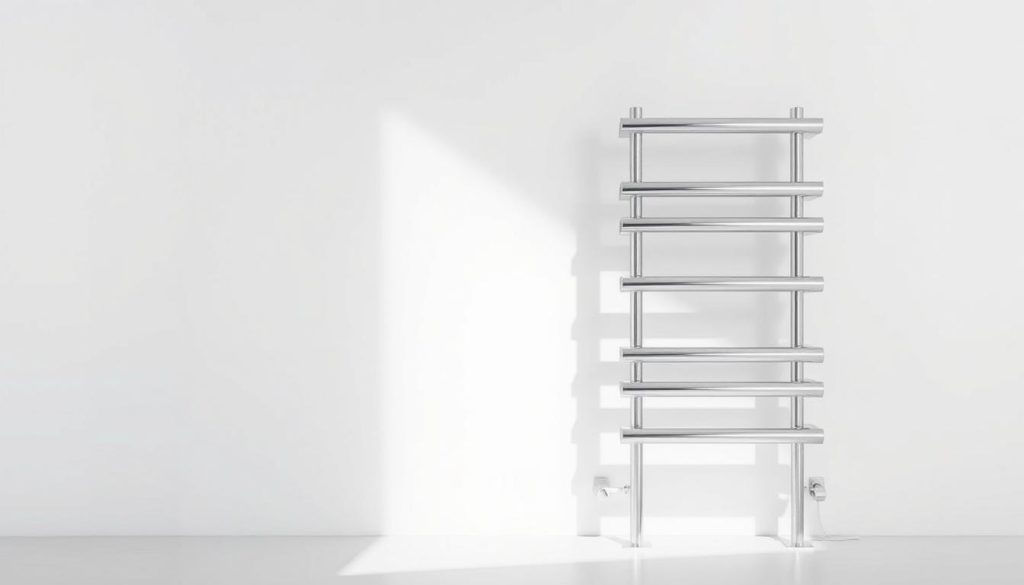
Use a clean microfibre cloth to polish chrome surfaces lightly until they reflect clearly without haze or streaks. Check valve bodies and caps for moisture and give them an extra dab dry so finishes stay crisp over the long term.
- Rehang towels neatly once all parts are dry so warm air circulates freely and your bathroom looks composed and inviting.
- For dual fuel and heated towel rail fixtures, confirm controls are dry before any power is restored or timers resume.
- Step back and inspect from different angles to catch missed smudges or lint; give a quick final buff if needed.
| Task | Why it matters | Tip |
|---|---|---|
| Final dry | Prevents rust and mineral spots | Use a microfibre cloth; dry joints and valve caps |
| Polish chrome towel | Restores mirror-like finish | Avoid abrasives; buff lightly until clear |
| Rehang towel items | Allows free airflow and tidy appearance | Ensure all surfaces are completely dry first |
Regular cleaning schedule: quick dusting, periodic deep cleans
A simple schedule stops grime piling up and keeps heat working efficiently when you need it. ELFA Cleaning LTD encourages a realistic routine that keeps effort low and results high.
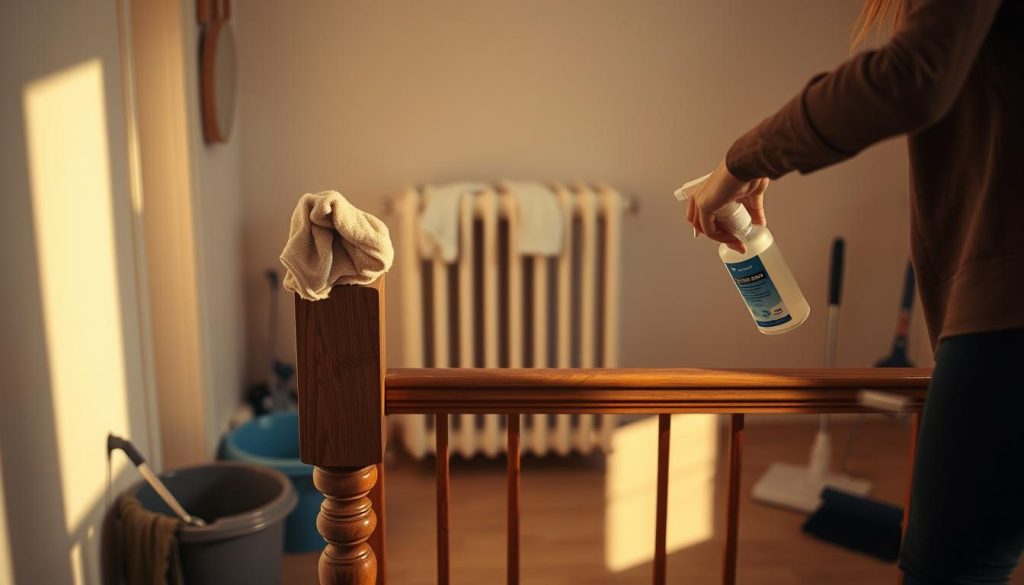
Weekly microfibre dust, monthly wipe-downs
Adopt a weekly dust of radiators and rails with a microfibre or vacuum brush so lint never accumulates to stubborn levels. This quick step takes minutes and prevents larger tasks later.
Plan a monthly wipe using a mild solution to remove films and fingerprints. Pay attention to bathroom humidity hotspots and the towel radiator where water marks form most often.
Seasonal deep clean before heating-on time
Schedule a deeper pass before the heating season begins. A full seasonal effort avoids that dusty smell on first use and restores even heat output.
- Include a quick check of valves, brackets and visible pipework to spot early wear or minor leaks.
- Rotate focus areas—hallway, bathroom, bedrooms—so each zone gets regular attention without it feeling like a chore.
- For column radiators, slot in a long-brush run between sections quarterly to keep convection channels clear.
- Wipe a towel radiator dry after shower steam sessions to prevent watermarks and reduce polishing time later.
| Frequency | Task | ELFA tip |
|---|---|---|
| Weekly | Microfibre dust or vacuum brush | Quick pass to stop dust build-up |
| Monthly | Light soapy wipe-down | Focus on bathroom and high-touch areas |
| Quarterly | Long-brush between column radiators | Keep internal channels clear for heat flow |
| Seasonal | Deep clean before heating-on time | Includes valves, grills and a final polish |
Step into a routine that fits your home. Small, regular actions save time and maintain efficiency across radiators and towel rails while keeping rooms healthier and more comfortable.
Common mistakes to avoid during the process
ELFA Cleaning LTD helps you sidestep pitfalls that lead to streaks, damage or safety risks.
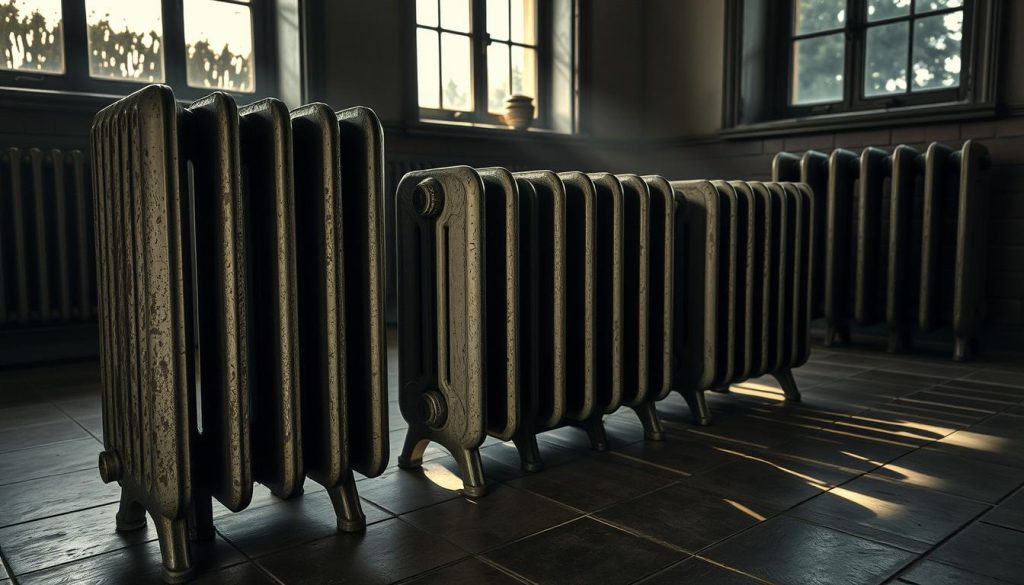
Never work on hot units. Heat bakes in grime and raises the risk of scalds and streaks. Let a radiator cool fully before any work.
Keep moisture controlled. A well-wrung cloth is safe; a soaked sponge can drip into vents or electrical parts and cause damage.
- Avoid spray cleaners and strong chemicals that can dull a chrome towel radiator or leave sticky residues.
- Don’t ignore debris behind grills — blocked airflow undoes surface work and reduces efficiency.
- Be gentle around radiator valves; twisting or knocking them can upset heating balance or start a leak.
- Disconnect electric radiators and heated towel fixtures before using any damp method.
- If cold spots persist, internal sludge needs professional powerflushing rather than repeated surface attention.
| Mistake | Risk | Quick fix |
|---|---|---|
| Cleaning hot unit | Scalds, streaks, warping | Switch off and cool fully |
| Using soaked sponge | Water into vents/electrics | Use wrung cloth; change often |
| Sprays on chrome | Etching, dull finish | Use mild solutions and polish |
| Ignoring grill debris | Reduced airflow, lost heat | Vacuum behind grills before surface work |
Finish by rinsing and drying cloths during the job to avoid spreading dirt or streaks. Small precautions protect finishes and preserve heat performance.
Supplies and delivery notes in the UK
Stocking the right kit means the job finishes faster and causes less fuss. ELFA Cleaning LTD suggests practical supply options for UK homes and how to choose tools that reach tight gaps without fuss.
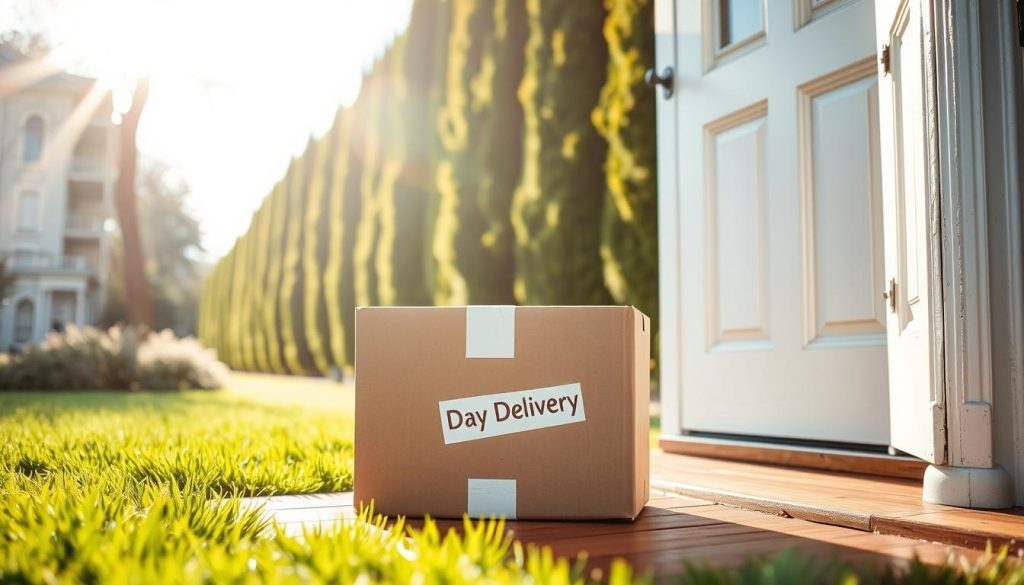
Choosing the right tools for steps and tight spaces
Look for flexible long dusters for column radiators and top-grill fins. They reach narrow channels so you need not dismantle units.
Prioritise microfibre and non-abrasive cloths for a chrome towel radiator and glossy enamel. Keep a separate set for the bathroom to avoid cross-contamination.
- Choose flexible radiator brushes sized for narrow fins and columns to protect paint and trims.
- Select a vacuum attachment kit with a soft brush head for delicate valve areas and radiator valves.
- For dual fuel towel or electric towel setups, add insulated gloves and cable ties to clear cords safely.
- Include a gentle metal polish for chrome surfaces; always test on a hidden spot first.
- Many UK retailers offer fast options like day delivery and thresholds for free delivery orders so you can restock quickly.
| Item | Why it helps | Buy tip |
|---|---|---|
| Flexible radiator brush | Reaches narrow fins without removal | Look for full-length reach for column radiators |
| Microfibre cloths | Safe on chrome towel radiator and enamel | Keep one set for the bathroom only |
| Vacuum attachment kit | Protects radiator valves and tight joins | Soft brush head for delicate areas |
| Long duster | Works down tall radiators and grills | Choose flexible shafts for high reach |
Tip: Many suppliers offer next day delivery and even free delivery orders at a minimum spend, making it simple to gather everything before a planned tidy.
Professional help from ELFA Cleaning LTD across the UK
ELFA Cleaning LTD offers nationwide expertise for detailed home service visits. Our teams provide careful removal of top grills, deep dust extraction between fins and safe surface work on chrome towel radiator finishes.
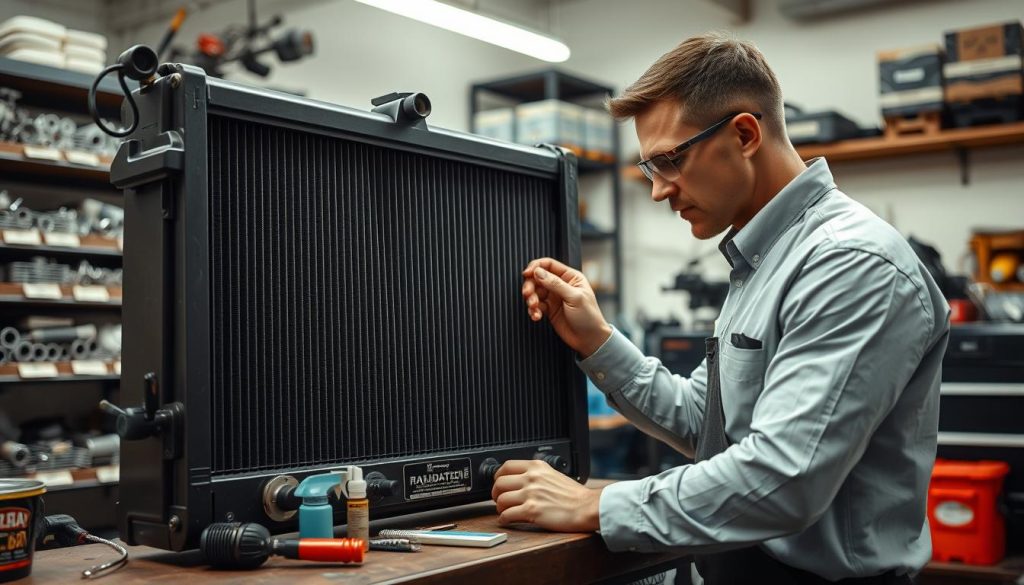
What we do on-site
- Whole-home sessions that pair methodical surface work with checks of radiator valves and brackets.
- Specialist care for heritage column radiators and cast iron units, using non-abrasive tools to reach tight gaps.
- Chrome towel and heated towel polishing to restore a mirror-like finish in bathrooms and ensuites.
- Safe isolation and moisture control for dual fuel and electric radiators, including tidy cable management.
- On-site use of long dusters, lint-free cloths and protectors to keep disruption low.
If warmth remains uneven after a full service, we can arrange diagnostic checks or recommend a professional powerflush via trusted partners to remove internal sludge and restore even heat output.
Conclusion
A quick set of easy steps will restore shine while improving heat across your home. Start with a dry dust, follow a mild soapy pass for trouble spots, then dry and polish so surfaces perform well.
Tailor the approach by type: use a long brush for column radiators, mild solutions or vinegar for a chrome towel radiator, treat electric parts cautiously on electric radiators or dual fuel systems. For top grills remove panels, clear fins, then dry the unit thoroughly.
Weekly light dusting plus a seasonal deep clean keeps a surface radiator and towel rail working, reduces smells, improves heat response. If access is awkward, finishes are delicate or internal sludge is suspected, contact ELFA Cleaning LTD for specialist help.
FAQ
What is the safest first step before touching a banister or radiator?
Switch off the heat source and let heated towel rails, electric radiators or central heating radiators cool completely. This reduces burn risk and prevents steam or dripping water from reaching electrical components or valves.
Which tools should I have ready for the job?
Gather soft cloths, a microfibre cloth, a cloth sponge, a radiator brush and a hoover. Keep a step stool for high rails, a small amount of mild detergent, white vinegar for limescale and a long-handled brush for tight gaps.
How do I remove loose dust from banisters quickly?
Start with dry dusting using a microfibre or lint-free cloth, working top to bottom. A hoover with a dusting attachment helps clear spindles, newel posts and debris from corners before any wet cleaning.
Can I use spray cleaners on radiators and towel rails?
Avoid aerosol sprays that soak into vents or reach electrical parts. For surface radiator fronts and chrome towel radiators use a damp microfibre cloth or soapy water on a cloth sponge, then dry radiator thoroughly to prevent spots and rust.
What’s the best way to deal with hard water stains on chrome towel radiators?
Apply a white vinegar solution sparingly to watermarks, leave briefly, then wipe and buff with a microfibre cloth. For polished finishes avoid excess water; use a lint-free cloth for the final polish.
How do I clean a radiator with a top grill?
Unclip side panels and lift off the top grill where possible. Use a radiator duster and hoover to clear fins and internal dust. Finish with a damp cloth on stubborn grime, then reassemble and wipe the outside surface.
Any special care for column radiators and cast iron models?
Use a DIY long brush or cloth-on-stick to reach between columns. A soft soapy wipe and a toothbrush for joints work well. Be gentle on painted or polished surfaces to avoid chipping or water damage.
How should I approach electric towel rails and electric radiators safely?
Unplug or isolate at the mains before cleaning. Use a damp microfibre wipe, avoid dripping water near vents and dry radiator thoroughly. Inspect the plug, thermostat and cables for wear while the unit is isolated.
What precautions for dual fuel towel radiators and valves?
Make sure the radiator is off at both the electric and central heating controls. Clean carefully around radiator valves and joints, avoiding excess moisture near valve internals to maintain performance.
How do I protect wood or painted banisters during cleaning?
Use a soft cloth and a small amount of mild detergent diluted in soapy water; wipe top to bottom. Dry thoroughly to protect wood, paint or varnish, and avoid abrasive tools that could scratch the surface.
How often should I perform light and deep cleaning?
Dust weekly with a microfibre cloth and perform a wipe-down monthly. Schedule a seasonal deep clean before heating-on time to clear hidden dust and improve efficiency.
What common mistakes should I avoid?
Do not use harsh sprays near electrics, avoid soaking radiators or towel rails, and never scrub polished finishes with rough tools. Also, don’t forget to dry surfaces completely to stop rust or watermarks.
Are there specific supplies available with delivery across the UK?
Many suppliers offer microfibre cloths, radiator brushes and gentle detergents with free or day delivery options. Choose tools designed for tight spaces and steps, and check delivery terms for your area.
When should I call professional help from ELFA Cleaning LTD?
Contact ELFA Cleaning LTD for large or hard-to-reach jobs, delicate polished radiators, or when you prefer a full service across the UK. Professionals can safely handle electric towel rails, dual fuel systems and detailed valve work.
